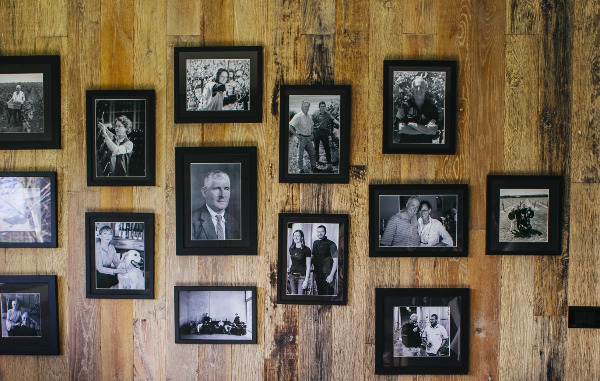Memory Sculpting

I was having a Facebook conversation with a friend about how photos and videos change our memories. Kids who grew up in the past 30 years - and more so in the age of smartphones and social media - have definitely had their memories sculpted by images of their past. My sons have said to me several times when I ask them "Do you remember us being there?" that "I remember the photos of it." Do the photos trigger a memory to return or is the photo the memory itself?
I am fascinated by how memory works. Research shows that when we describe our memories differently to different audiences it isn't only the message that changes, but sometimes it's also the memory itself. Every time you remember an event from the past, your brain networks change in ways that can alter the later recall of the event. The next time you remember it, you might recall not the original event but what you remembered the previous time. This leads some to say that memory is like the "telephone game."
This sent me back to an article I read in 2017. I did a search and found it again since my memory of this article on memory may not be remembered correctly. It is titled "Facebook is Re-Sculpting Our Memory" by Olivia Goldhill. Facebook is not the only social network or the only place that we share photos and videos, but it is a major place for this sharing.
I have a new granddaughter and her parents have set up a shared photo album online for relatives. They don't want people (mostly me - the oversharer) to post photos of her on Facebook, Instagram et al. I understand that privacy caution. My granddaughter will have many thousands of photos and videos to look at one day. I have about two dozen black and white photos of my first two years of life. It is probably two 12 photo rolls of film from that time (the 1950s) which seemed like enough to my parents to chronicle my early life.
Those photos of baby me don't trigger any memories but they are my "memory" of that time along with my mother's narration. "That was your stuffed lamb that was your favorite toy."
I have also kept journals since my teen years. The way to chronicle life once was to write it down. Rereading those journals now is a mixed experience. For some things, the journal is now my memory. Without the entry, I couldn't recall names, places or details from 40 years ago. But for some entries, I know that the version I wrote at age 15 is a kind of augmented reality. I made some things sound better or worse than the actual event. I sculpted the memory. Maybe as my memory degrades, those entries - accurate or not - will become the only memory I have.
Those sculpted memories are not unlike the image of ourselves we put online. Not all, but many people, post almost exclusively the best parts of their lives. Alfred Hitchcock said "Drama is life with the dull bits cut out," and that's true of many virtual lives as portrayed online.
That article references Daniel Schacter, a psychology professor at Harvard University, whose 1990s research first established the effects of photographs on memories. Frighteningly, he showed that it was possible to implant false memories by showing subjects photos of an event that they might have experienced but that they didn’t experience.
Another of his experiments found that while looking at photos triggered and enhanced the memory of that particular event, it also impaired memories of events that happened at the same time and were not featured in the photographs.
This sounds terrible, but one positive effect he has found that comes from weaknesses in our memory helps allow us to think meaningfully about the future.
In our recent discussions about fake news and images and videos that are not accurate, we realize that these weaknesses in memory and the ability to implant memories can be very powerful and also very harmful. "Source information” is a weakness of memory that can be tapped for devious purposes. How often have you heard someone explain that they heard it or read it or saw it "somewhere?" We commonly have trouble remembering just where we obtained a particular piece of information. Though true off-line, for online information we may recall a "fact" but not the source - and that source may Online, this means we could easily misremember a news story from a dubious source as being from a more credible publication.
One phenomenon of memory is now called “retrieval-induced forgetting” I spent four years living at my college but I have a limited number of photographs from the time. Those photos and ones in yearbooks and some saved campus newspapers, plus my journal entries are primarily what I recall about college life. Related things that I can't review are much harder, if not impossible, to remember.
Social media is certainly sculpting (or perhaps resculpting) our memories. Is this making our ability to remember worse? That's not fully determined as of now. Nicholas Carr wrote a book called The Shallows: What the Internet Is Doing to Our Brains
Facebook, Instagram, TimeHop and other tools are reminding me daily of memories from years past. At times, I think "Oh yes, we were in Prague on this day two years ago." Other times, I say to myself, "I don't remember writing this 4 years ago." I react the same way to my old journals and black and white photos in an album taken a half-century ago.
Trackbacks
Trackback specific URI for this entryThe author does not allow comments to this entry
Comments
No comments